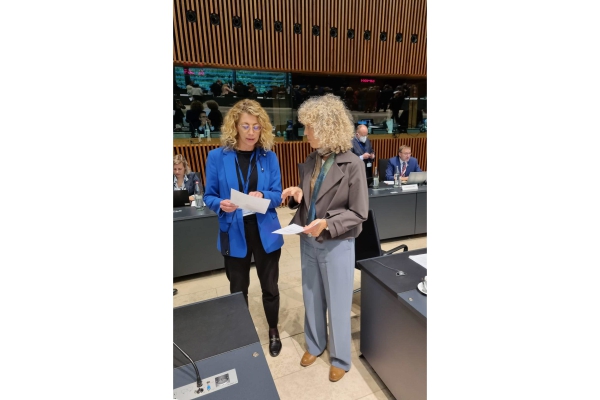 Credit: MECDD
Credit: MECDD
On Tuesday 24 October 2022, Luxembourg's Minister for the Environment, Climate and Sustainable Development, Joëlle Welfring, took part in the European Union's "Environment" Council.
Alternating every three months between Brussels and Luxembourg, the Council was held on Monday at the European Convention Centre in Luxembourg-Kirchberg. This was the first of two Councils planned under the Czech Presidency.
International Conferences on Climate Change and Biodiversity
European Union (EU) environment ministers first endorsed two sets of Council conclusions, which constitute the EU's overall negotiating mandate ahead of the 27th UN Climate Change Conference (COP 27) and the 15th UN Biodiversity Conference (COP 15). Like each EU Member State, Luxembourg transfers its negotiating mandate to the European Union during these two major international conferences.
On the subject of COP 27 in Sharm El-Sheik, Minister Welfring specified that within the EU, "Luxembourg has clearly understood that ambitious climate and energy transition policies are urgently needed to deal with the climate crisis and modernise our society, but also to improve our situation in terms of geopolitical independence. This is the message we want to bring to the COP. We want to motivate and encourage imitation of our partners at the global level”.
As for the international negotiations on biodiversity, scheduled for mid-December in Montreal, Minister Welfring first recalled that the global report of the Intergovernmental Science and Policy Platform on Biodiversity (IPBES) highlighted the dramatic situation of biodiversity and the urgency of acting to restore biodiversity at the global level. This scientific report sets the baseline for global biodiversity and outlines red lines for COP negotiations. “It will be necessary to guarantee that these red lines will not be exceeded in the negotiations in Montreal,” said Minister Welfring.
Industrial Emissions Directive
EU environment ministers then held two orientation debates. The first debate concerned the proposed revision of the directive on industrial emissions.
In this context, Luxembourg generally welcomed the extension of the scope of the Directive, bringing a multitude of opportunities in the field of the environment, but also important changes for the agricultural sector, such as for example the consequent reduction of ammonia and methane coming from this sector.
In this context, Minister Welfring noted the importance of the financial aid made available to the agricultural sector in the context of the green recovery, which must be reoriented so as to also target an improvement in the management of nitrogen at the scale of the EU. In light of its commitments arising from the NEC directive, Luxembourg has already reworked its regulations on nitrogen fertilizers to better target its reductions.
For Minister Welfring, the introduction of effective, dissuasive and proportionate sanctions is of crucial importance. However, questions about the practical implementation of these new provisions remain. For example, according to Minister Welfring, "the proposal which seeks a reversal of the burden of proof with regard to the compensation scheme is certainly interesting, but requires a detailed examination as to the consequences".








